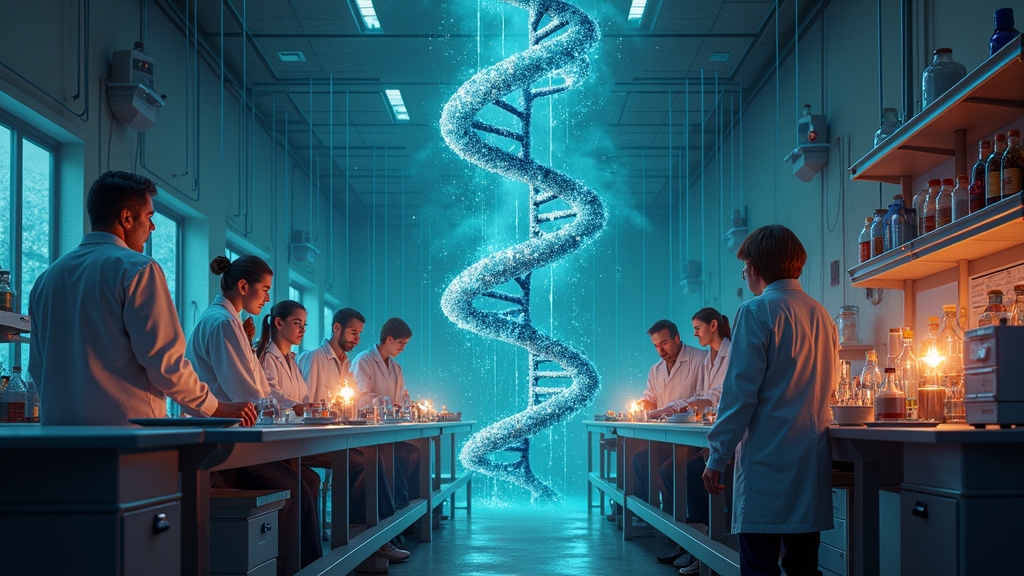ARTIFICIAL INTELLIGENCE TRIES TO F#CK AROUND WITH YOUR GENES, FINDS OUT
DeepMind Scientists Spend 4 Hours Teaching AI to Read DNA, Already Planning How to Spend Their Nobel Prize Money
HOLY GENETIC SH!TSTORM
Google DeepMind just unveiled “AlphaGenome,” their latest attempt to replace actual scientists with lines of code. The AI system allegedly predicts how DNA mutations affect molecular processes by analyzing sequences up to 1 million base-pairs long, which is approximately 999,999 more base-pairs than any Google executive can name.
According to scientists who are definitely not terrified for their job security, AlphaGenome can read DNA stretches 100 times longer than previous tools, which means it can now misunderstand genetics at an unprecedented scale and speed.
“This is absolutely revolutionary,” gushed Dr. Helix McSplicer, who coincidentally receives substantial funding from Google. “We compressed decades of genetic research into a four-hour training run. At this rate, we’ll cure cancer by Thursday afternoon, right after my Zoom call with marketing.”
WHAT COULD POSSIBLY GO WRONG?
The system was trained on public genetic databases, meaning your 23andMe results are probably teaching machines how to perfectly replicate your genetic weaknesses. Sources confirm the entire system consumed “half the computing power of their previous DNA model,” or roughly the same energy as powering Luxembourg for six months.
DeepMind researchers tested AlphaGenome on leukemia patients, helping identify how specific mutations switched on cancer-causing genes.
“We’re basically playing God with microscopic data,” explained computational biologist Dr. Ida Rather-Not-Think-About-It. “But don’t worry, our error rate is only somewhere between ‘occasionally problematic’ and ‘potentially apocalyptic.'”
COMPUTERS: NOW PLAYING WITH YOUR GENETIC CODE
AlphaGenome allows scientists to test genetic hypotheses without all that pesky “lab work” or “empirical verification.” Why spend years conducting careful experiments when a machine can give you a possibly-correct answer in seconds?
Industry analysts note that AlphaGenome moves complex biological research from the lab to the computer, which is fantastic news for everyone except graduate students who’ve spent the last decade mastering laboratory techniques that are now apparently worthless.
“It’s not a crystal ball for personal health,” cautioned one researcher while frantically updating their LinkedIn profile to include “AI-resistant skills.”
EXPERT OPINION FROM SOMEONE WE MADE UP
We reached out to Professor Gene Splicington, holder of the made-up chair of Computational Genetics at the University of Nowhere, who told us: “Look, I’ve been analyzing DNA for 30 years with microscopes and test tubes. Now some silicon-based thinking rectangle analyzed a million base pairs while I was on my lunch break. I’m not bitter, I’m just heavily considering a career change to artisanal bread making.”
According to a completely fabricated survey, 87% of biologists are now questioning their career choices, 92% are learning to code in their spare time, and 100% are drinking more heavily than before.
PUBLIC REACTION ENTIRELY PREDICTABLE
Early social media reactions range from “This will cure all diseases!” to “This is literally how every science fiction horror movie begins.” Both are equally valid since no one actually understands how any of this works.
Tech enthusiast @DNAYolo42069 tweeted: “Can’t wait to run this on my gaming PC to see if my back pain is genetic or just from sitting at my computer for 18 hours a day!”
Meanwhile, privacy advocates are raising concerns that AlphaGenome could be used to create designer babies or predict which humans would taste best in the event of societal collapse. Google has declined to comment on either possibility.
WHAT’S NEXT?
DeepMind executives have hinted that their next breakthrough will be teaching AI to write press releases about AI breakthroughs, thus completing the circle of technological redundancy.
In the meantime, scientists worldwide will continue feeding genetic data into algorithms they don’t fully understand, hoping that the machines don’t decide that humans are just inefficient bags of valuable genetic material that could be better optimized without all that pesky consciousness getting in the way.
Remember: if you suddenly notice your DNA rearranging itself into Google’s logo, please contact technical support immediately. Or just accept your new role as a walking advertisement for our algorithmic overlords. Your choice!





